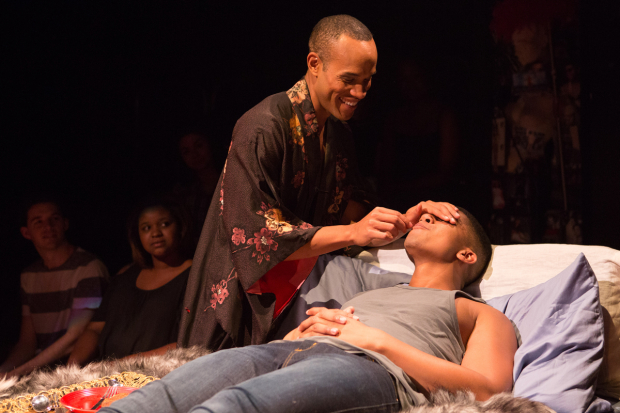Wig Out!

(© Teresa Wood)
Among young modern playwrights, Tarell Alvin McCraney has one of the most perceptive takes on human interaction. Perhaps most important, his is a very powerful voice for a generation of African-American and Latinx LGBTQ artists who are changing the way society talks about gender and sexuality.
McCraney has updated his 2006 play Wig Out! for a stunning production at Studio Theatre. The show is a bold, intimate, funny, sometimes brutal look at the African-American/Latinx ballroom culture, which consists of spectacular, competitive fashion and dance events between "houses" or families that shelter lost souls from the racism and homophobia they find in wider society. The balls provide a mode of self-expression.
Wig Out! starts late one night in a subway when a handsome young man named Eric (Jaysen Wright) notices a beautiful woman. When the woman, Nina (Michael Rishawn), tries to strike up a conversation, Eric makes it clear that he likes men. Nina trades her six-inch heels for sneakers, slips off her wig, invites Eric to her house, and introduces him to the roller coaster ride that is her sexually and sensually charged world.
Nina is a member of one of these ballroom houses, the House of Light, where she once landed by chance and was fortunate enough to find Rey-Rey (Jamyl Dobson), the house's mother. She also found Lucian (Michael Kevin Darnall), its father. Normally, the house is in a fine routine, as related by the Greek chorus called the three Fates (the communally spectacular Dane Figueroa Edidi, Ysabel Jasa, and Melissa Victor).
But at that particular moment, the House of Light is in an uproar. Word has come that the house has been summoned to appear the next night at a ball hosted by their rivals, the House of Di'Abolique. That gives them only one day to prepare for an intense runway show full of dancing, costumes, and attitude. Di'Abolique, on the other hand, headed by Serena (Frank Britton), has had weeks to prepare, so the House of Light has reason to be alarmed. Venus (Edwin Brown III) and her old flame Deity (Desmond Bing) prepare a song together. Deity starts mixing a tape. But when Nina arrives with Eric, she is severely scolded by Lucian for not being in costume and for bringing an outsider.
While the first act establishes the relationships between the characters, the second act is the ball itself, with appearances from members of the House of Light punctuated by appearances from members of the House of Di'Abolique.
Wright is brilliant as Eric, playing him as simultaneously naive and sophisticated. He makes the depth of Eric's attachment to Nina seem palpable. In the same way, Rishawn's ability to endow Nina with humor and gentleness allows the connection between her and Eric to seem credible. Dobson is touching as Rey-Rey, particularly in a scene where he dons his makeup and muses on the fact that he is aging and losing a place of power in the house.
Brown is delightful as the flirty Venus who still adores Deity, while Bing brings a sensitivity to Deity. Britton's Di'Abolique is larger than life, first as he enters the ball dressed as an outsize Kabuki figure and then as Serena in a Medusa wig. Alex Mills is astonishing as the contortionist Loki, somersaulting and back-flipping his way through the play. Darnall portrays the evil Lucian with appropriately smarmy, egomaniacal swagger.
Kent Gash has directed Wig Out! smoothly, ably assisted by choreographer Dell Howlett. Costume designer Frank Labovitz has outdone himself with sexy dresses, wigs, and spike heels. Sound designer David Lamont Wilson has come up with a soundtrack that gives Jay-Z's and Beyoncé's "Welcome to Hollywood" a new reason for being. Jason Sherwood's set is a runway with four mirrored entrances and lots of feathers, glitter, and mannequins of nude male and female torsos on the walls.
Wig Out! weaves a little too much into melodramatic territory near the end. But as emotions flare, sizzle, and stay flamboyant, the actors are performing an important social function in addition to entertaining: They are communicating, advocating, showing what it looks like to need to belong, and how important it is to get validation.











